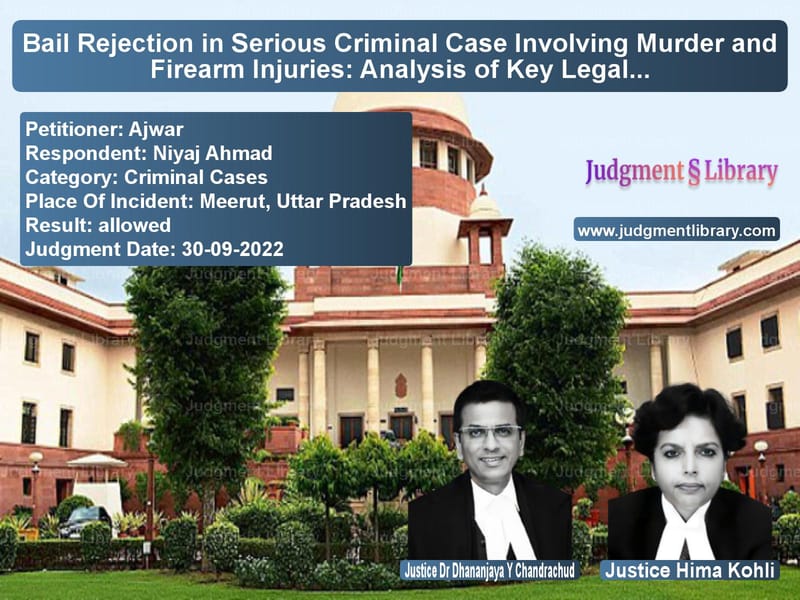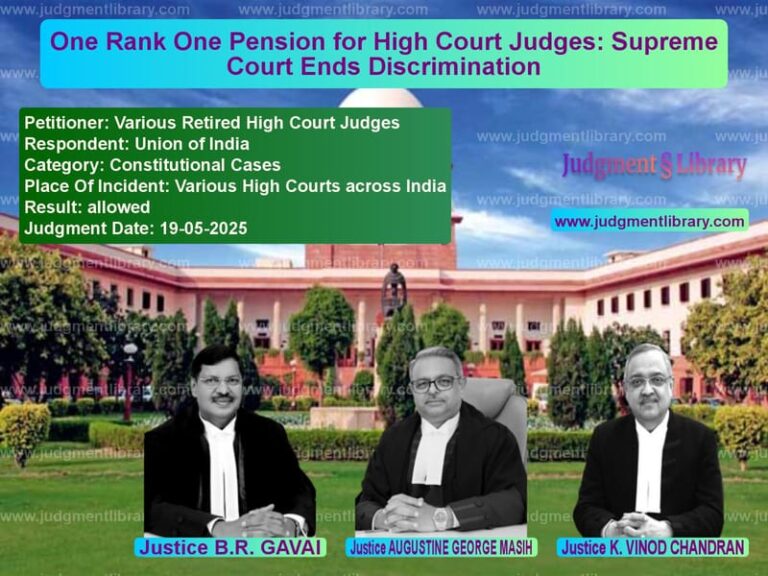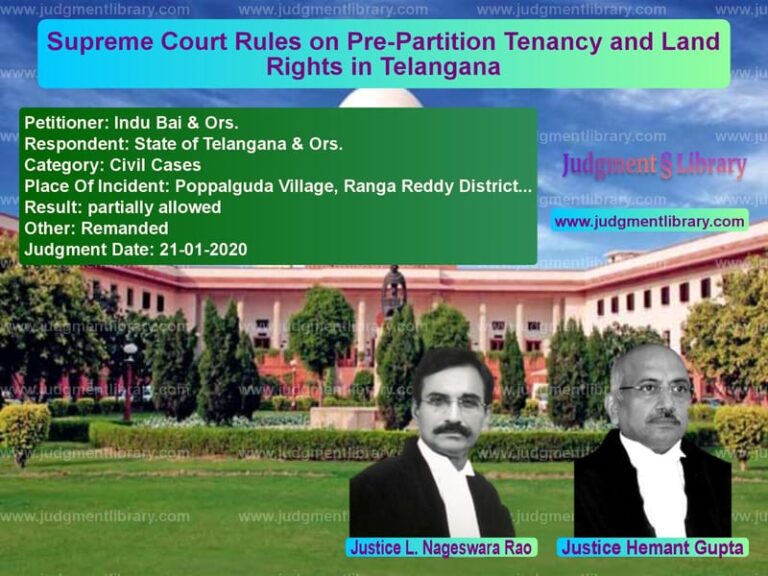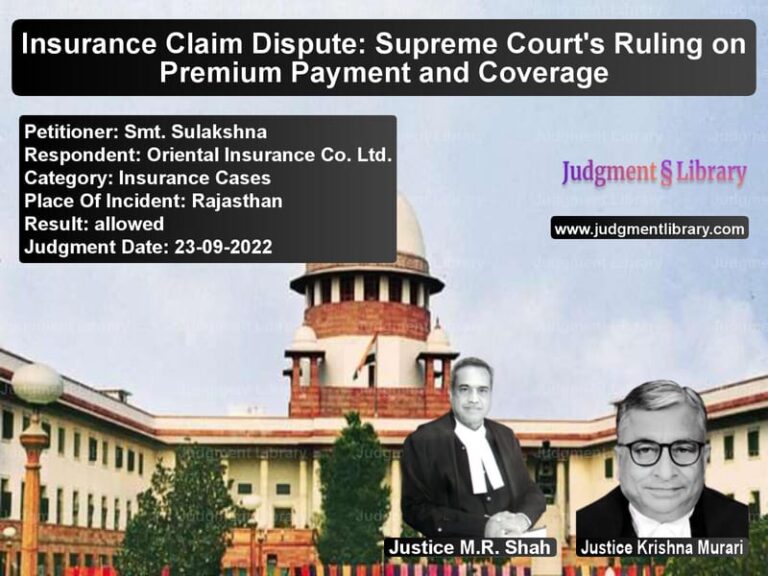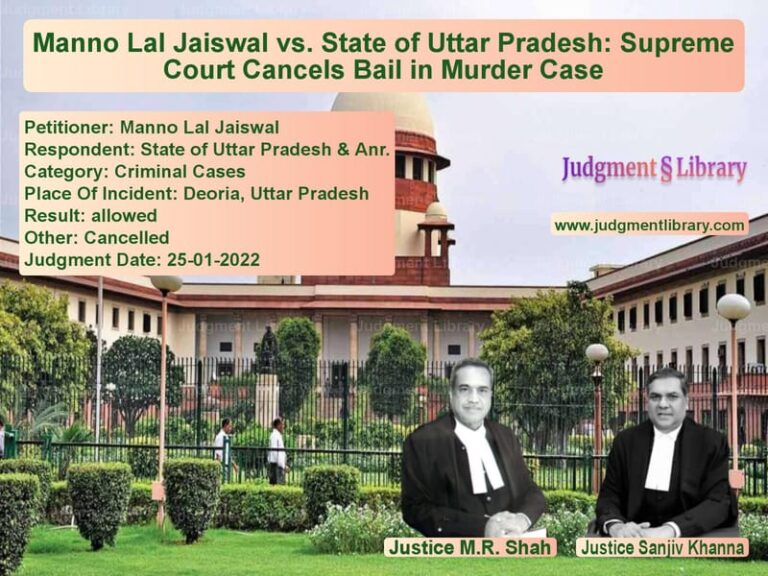Bail Rejection in Serious Criminal Case Involving Murder and Firearm Injuries: Analysis of Key Legal Principles
The case at hand revolves around the appeal against the grant of bail to Niyaj Ahmad, the first respondent, in connection with the alleged murder of two individuals, Abdul Khaliq and Abdul Majid. The incident occurred on May 19, 2020, in Meerut, Uttar Pradesh, and was precipitated by prior enmity between the parties involved. The appellant, Ajwar, moved the Supreme Court challenging the bail order passed by the High Court. The Court thoroughly examined the matter, focusing on the serious nature of the offenses, the role of the first respondent, and his conduct during the trial. This blog post dissects the arguments presented by both parties, the judge’s reasoning, and the Court’s ultimate decision.
Petitioner’s Arguments
The appellant, Ajwar, made the following arguments:
- Murder of Family Members: The appellant’s two sons, Abdul Khaliq and Abdul Majid, were murdered in the course of the incident, with the former sustaining a fatal head injury and the latter succumbing to injuries caused by gunshot wounds to the abdomen.
- Role of the First Respondent: The first respondent was not named in the FIR but was later implicated through statements recorded under Section 161 of the CrPC. The appellant specifically pointed out that the first respondent played a direct role in the murder.
- Delayed Trial: Despite an order by the High Court directing the expeditious conclusion of the trial, the first respondent’s repeated adjournments have led to delays. This behavior further highlighted the lack of cooperation from the accused.
- Witness Statements: The statements of various witnesses, including the appellant, have clearly identified the first respondent as a key player in the crime.
Respondent’s Arguments
On the other hand, the first respondent, Niyaz Ahmad, raised the following points in his defense:
- Cross-Case Allegations: A cross-FIR was filed by the wife of the first respondent, claiming that he had been injured during the same incident. This cross case was used to argue that the first respondent had a legitimate reason for being present at the scene of the crime.
- Closure Reports: The first respondent highlighted the fact that the police had submitted closure reports twice in relation to the FIR, suggesting that there was insufficient evidence to implicate him.
- Medical Injury: The first respondent also argued that he had suffered a gunshot injury during the incident, which was documented in his injury report, lending credibility to his version of the events.
Arguments by the State
The State of Uttar Pradesh, supporting the appellant’s case, emphasized:
- Seriousness of the Crime: The murder of two individuals through gunshot wounds, as evidenced by the postmortem reports, highlighted the grave nature of the offense.
- Involvement of the First Respondent: The role of the first respondent was clearly established through various witness statements and the charge-sheet filed by the police.
- Evidence of Firearms: The recovery of firearms, including country-made pistols, further substantiated the case against the first respondent.
- Evading Trial: Despite being granted bail previously, the first respondent had failed to attend court proceedings, highlighting a lack of commitment to the judicial process.
Judge’s Arguments
Dr. Dhananjaya Y Chandrachud, J., delivered the judgment, and his reasoning for rejecting the bail order was as follows:
- Lack of Proper Reasoning by the High Court: The judge criticized the High Court’s order for granting bail without providing detailed reasoning. He noted that the Court had merely stated general legal formulations without delving into the specifics of the case. This approach did not satisfy the standards of open justice, which requires a detailed explanation of the factors influencing judicial decisions.
- Seriousness of the Crime: The judge highlighted that the crime in question was particularly severe, involving the cold-blooded murder of two individuals. The use of firearms in the incident made it all the more serious.
- Witness Testimony and Evidence: The judge gave significant weight to the statements of witnesses, including the appellant, and the evidence presented, which clearly pointed to the first respondent’s involvement in the murder. The postmortem reports also corroborated the allegations.
- Failure to Cooperate with the Trial: The judge emphasized that the first respondent had not cooperated with the trial process, as evidenced by his repeated requests for adjournments. This indicated an attempt to delay the trial, which weighed against his claim for bail.
- Non-application of Mind: The judge pointed out that the failure of the High Court to provide detailed reasoning for granting bail created a presumption of non-application of mind. He referred to the precedent set in the case of Mahipal v. Rajesh Kumar to highlight the importance of reasoned judicial orders.
The Court’s Decision
After carefully considering the arguments presented by both parties, the Supreme Court allowed the appellant’s appeal and set aside the High Court’s bail order. The first respondent was directed to surrender within two weeks, and the Court clarified that its observations would not affect the merits of the trial. The judgment reinforced the importance of providing reasoned decisions in judicial orders, especially in cases involving serious criminal offenses.
Read also: https://judgmentlibrary.com/appeal-allowed-in-murder-conviction-case-key-court-insights/
Conclusion
This case underscores the delicate balance that courts must maintain between ensuring the liberty of the accused and protecting the interests of justice. The decision emphasizes that while personal liberty is a constitutional right, it must be weighed against the gravity of the crime, the role of the accused, and the need to ensure a fair trial. The Court’s emphasis on reasoned decisions highlights the necessity of transparency and accountability in the judicial process, ensuring that justice is both done and seen to be done.
Petitioner Name: Ajwar.Respondent Name: Niyaj Ahmad.Judgment By: Justice Dr Dhananjaya Y Chandrachud, Justice Hima Kohli.Place Of Incident: Meerut, Uttar Pradesh.Judgment Date: 30-09-2022.
Don’t miss out on the full details! Download the complete judgment in PDF format below and gain valuable insights instantly!
Download Judgment: ajwar-vs-niyaj-ahmad-supreme-court-of-india-judgment-dated-30-09-2022.pdf
Directly Download Judgment: Directly download this Judgment
See all petitions in Murder Cases
See all petitions in Bail and Anticipatory Bail
See all petitions in Criminal Defamation
See all petitions in Judgment by Dhananjaya Y Chandrachud
See all petitions in Judgment by Hima Kohli
See all petitions in allowed
See all petitions in supreme court of India judgments September 2022
See all petitions in 2022 judgments
See all posts in Criminal Cases Category
See all allowed petitions in Criminal Cases Category
See all Dismissed petitions in Criminal Cases Category
See all partially allowed petitions in Criminal Cases Category

